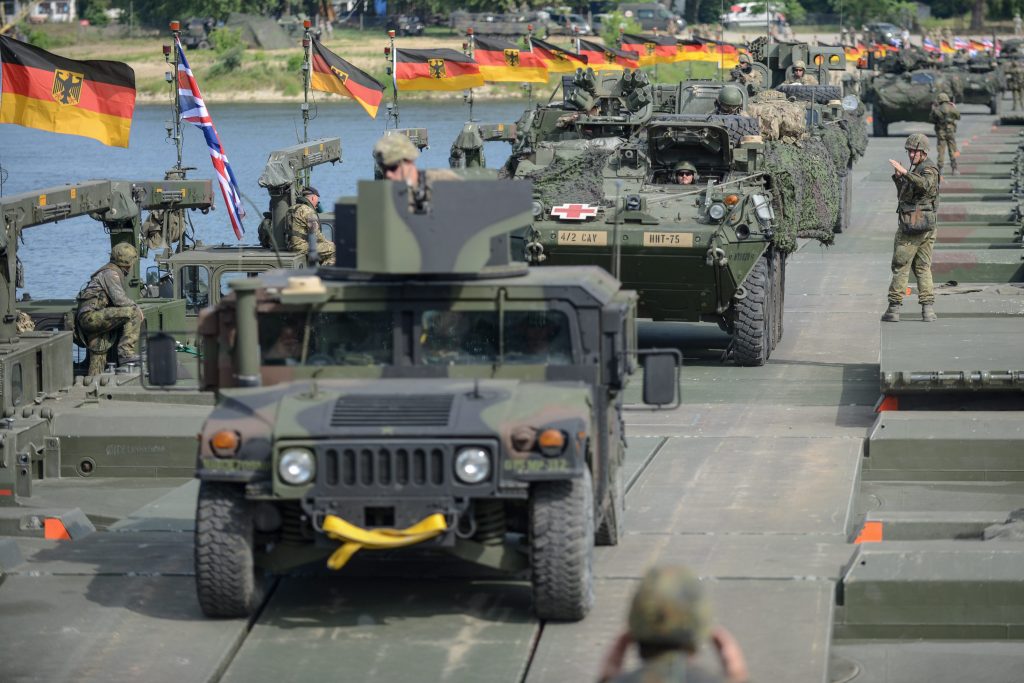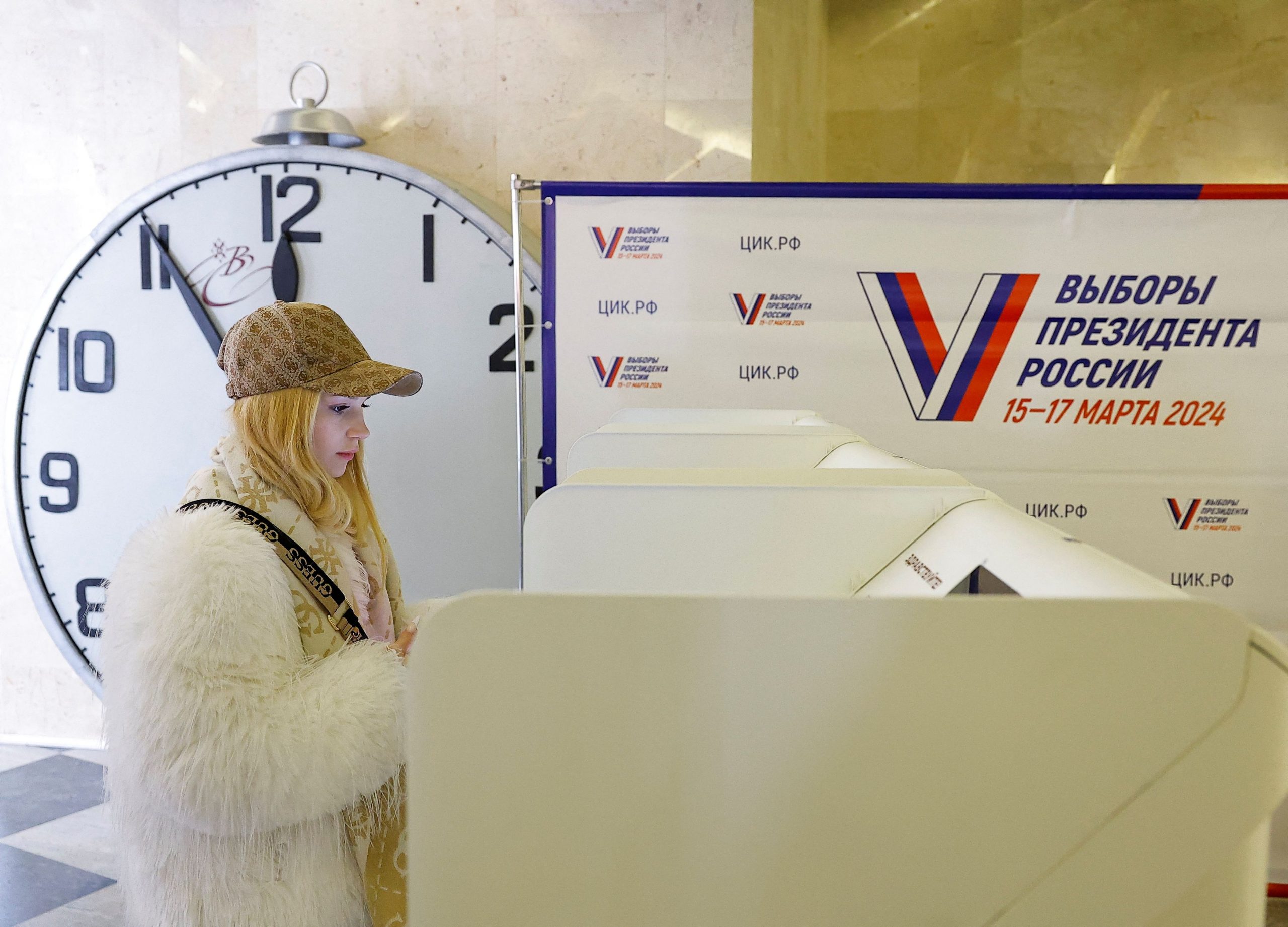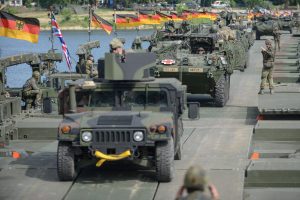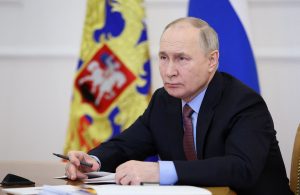The video splashing across Russian television screens in the run-up to this weekend’s presidential election didn’t leave much room for surprises. “Who will ensure development?” it asked. “Who guarantees stability? Who unites? And, in whom do you have confidence?”
“Only in him!” the narrator declared, as a highlight reel showed Vladimir Putin at work in his office, being exalted by adoring crowds and walking across red carpets to meetings with Asian and Arab leaders.
As voting begins Friday, Putin has left little to chance in his bid to secure another six-year term as Russia’s president, and with it the chance to become its longest-reigning leader since Joseph Stalin . Potential challengers have been barred from the ballot, critics have been jailed or have fled. His most potent opponent, Alexei Navalny , is dead, after falling ill, Russian authorities said, in the Arctic penal colony where he was serving a sentence totaling 30 years.
Handouts for families who lost relatives fighting in Ukraine have won support for the Russian leader, as have a relatively buoyant economy and new proposals to spend billions of dollars to eradicate poverty and rebuild Russia’s aging infrastructure.
The messaging ahead of the vote, which runs until Sunday, was careful to project Putin as the only figure who can keep the country united and save Russia from its foes in the West.
“He’s been very careful to make sure there’s nobody else on the ballot projecting a vision for the future,” said Samuel Greene, director for democratic resilience at the Washington, D.C.-based Center for European Policy Analysis. “The message from Putin essentially is that whatever future this country has runs through him.”
The Russian leader, who nominated himself to run, is all but guaranteed to win, binding the country to his deepening confrontation with the West over the war in Ukraine and what Putin sees as Russia’s rightful place in the world. But that isn’t to say the vote doesn’t matter. Analysts say the Kremlin is eager to present a semblance of democracy and use a high turnout to legitimize, and strengthen, Putin’s authority.
“The Kremlin is interested, first of all, in the absolute number of votes,” said Nikolai Petrov, a consulting fellow at British think tank Chatham House in an email. “Both turnout and voting for Putin should exceed 2018 indicating that citizens support their leader at a time of war.” Turnout in the last presidential vote was 67.5%. “Governors as well are interested in reporting high figures to demonstrate their loyalty and efficiency,” he said.
To make the vote resemble an actual election, there are opposition candidates on the ballot, though they were carefully vetted. All three are members of sanctioned parliamentary opposition parties that seldom go against the Kremlin’s wishes. No wild cards have been permitted—two local politicians who opposed the war in Ukraine, Boris Nadezhdin and Yekaterina Duntsova, were blocked after the electoral commission said it found errors in their paperwork.
“In the past, they would let somebody on the ballot who might be able to at least plausibly make a go of it to show that they have the strength to see them off,” said Greene, who is also a professor of Russian politics at King’s College London. “They’re not playing that game this time around.”
That polling stations, digital voting and the election commission are all controlled by the regime means that the outcome of the vote is essentially a done deal, government opponents said.
The election commission “will cook up figures in accordance with instructions that have already been issued by the Kremlin,” exiled Russian businessman and opposition activist Mikhail Khodorkovsky told a media briefing on Wednesday.
Khodorkovsky, a former political prisoner, said the country’s political opposition, including Navalny’s widow, Yulia Navalnaya , have joined forces in calling for voters to flood polling stations at noon on March 17 and, for those brave enough, to wear blue and white—colors that have been used to symbolize opposition to Russia’s invasion of Ukraine. The idea is to show that Putin’s opponents “are not marginalized, that there are lots of us,” Khodorkovsky said.
On Thursday, the Moscow Prosecutor’s Office said simultaneous arrival at polling stations is considered to be a punishable criminal offense, because it “can prevent citizens from freely exercising their voting rights.”
Presidential spokesman Dmitry Peskov last week dismissed criticism from overseas, saying, “Our democracy is the best.” The Kremlin didn’t respond to a request for comment on the allegations that the election results have already been fixed.
Meanwhile, in a televised address on Thursday, Putin appealed to Russians to exercise their civic duty and cast their votes for the candidate of their choice.
“I am convinced that you understand what a difficult period our country is going through now, what difficult challenges we face in almost all areas,” Putin said. “We continue to need to be united and self-confident.”
The election won’t only be held across Russia but also in the territories of eastern Ukraine that Moscow seized in 2022, though none are fully under Russian control. A polling precinct has even been established in the eastern Ukrainian town of Avdiivka , which Russia captured in February following months of grinding combat.
Putin has skipped any formal campaigning, such as TV debates, instead pushing his message through his regular presidential schedule, including meetings with youth groups and working out development programs with government officials.
He possibly doesn’t need to. The Levada Center, a polling group that bills itself as independent, found last month that some 86% of Russians approve of Putin’s activities as president, though analysts say many people are afraid to voice anything other than a glowing endorsement of the Russian leader.
The exception appears to be when Putin presents himself as challenging the U.S. While support for Ukraine has become a partisan issue in Washington , Putin doesn’t face any serious domestic opposition to the war aside from sporadic protests from wives and mothers hoping to bring their men home from the front. This has emboldened him and allowed him to mock and provoke the West, Kremlin watchers said.
In January, he made his first-ever presidential visit to the remote Far East region of Chukotka, which shares a maritime border with Alaska, across the Bering Strait. He also made a surprise trip to Kaliningrad, a Russian exclave sandwiched between Poland and Lithuania—both former parts of the Russian Empire, but today members of the North Atlantic Treaty Organization.
In February, he took a flight on a modernized Tu-160M nuclear-capable strategic bomber, which military aviation experts said is the largest supersonic aircraft in the history of military aviation. A few days later, he used the opening remarks to the country’s Federal Assembly to boast about Russia’s nuclear capability and warn of a nuclear conflict if Ukraine’s allies begin to play a larger part in the war. On Wednesday, Putin again broached the possibility of nuclear war , unlikely though it may be.
“We are ready to use weapons, including any weapons,” he said in an interview on state television. “If we are talking about the existence of the Russian state, about damaging our sovereignty and independence.”
This now appears to be Putin’s long-term approach—taking on the West and upholding what he says are Russia’s traditional Orthodox values. “Large-scale geopolitical confrontation with the West is now what Russian power is all about,” Greene said.
“What he needs from the West, oddly enough, is to play along,” he said. “He needs the West to be threatening. He needs the West to be skeptical of everything Russian. He needs the West to not only reject him but to look like it’s rejecting ordinary Russians.”
Write to Ann M. Simmons at ann.simmons@wsj.com






